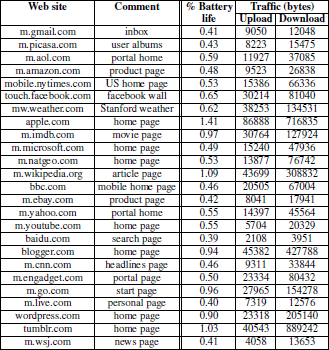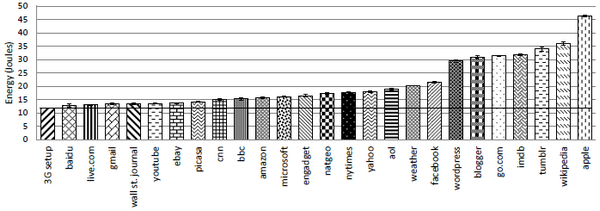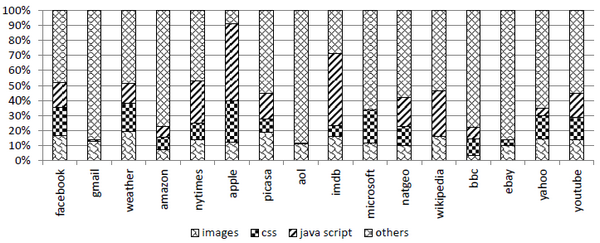"Bad" sites are discharging the battery of mobile devices
If you like surfing the Internet from a mobile device and periodically noticed that when you visit Wikipedia, your smartphone is discharged much faster than when reading articles on Habré, then now there is a reasonable explanation.
A team of researchers from Stanford University conducted a study on the dependence of the discharge of the battery on which site was opened in a mobile browser.
As a test device, a device on Android with 3G Internet was chosen, which opened popular sites such as CNN, BBC, Gmail, Amazon, Microsoft, eBay, Yahoo, Facebook, IMDB, Apple and Wikipedia.

As one would expect, more sites that were not originally optimized for the mobile web became the most energy-consuming. This, for example, sites such as Tumblr, Blogger, WordPress, as well as the Apple site, which in general has become the winner among the battery-discharging sites.
However, even sites with a mobile version, including Wikipedia, IMDB and Go.com, did not help much to save the smartphone charge.

')
In the course of research, it was found out that the whole thing is in layout, since the most resource-intensive processes are image rendering, the presence and type of caching, Javascript and CSS processing, especially if there is animation there, which is logical.
The article also contains tips on optimizing the page.
For example, if you touch the images, the researchers urge to abandon the PNG format in favor of JPG and GIF.
Also, CSS optimization is important. The suboptimal style sheets are one of the main reasons why Apple’s page discharges the smartphone more than others.

JavaScript optimization is equally important. Downloading jquery alone takes 5 joules. What to say, if there are several such libraries.
However, this study came up with critics. Among them - Remi Sharp, who walked through the main points of the article, providing them with their own comments . In particular, he does not agree with the study of the work of Gmail, which, by the way, received the title, the most “green” mobile site, i.e. The most optimized site for mobile devices.
The research results were officially presented at the World Wide Web 2012 conference in Lyon last week. I think in the near future we can expect a stream of articles and comments on this topic. And the topic itself is becoming increasingly relevant, as the mobile web is developing in leaps and bounds, which can not be said about the batteries of modern smartphones.
A team of researchers from Stanford University conducted a study on the dependence of the discharge of the battery on which site was opened in a mobile browser.
As a test device, a device on Android with 3G Internet was chosen, which opened popular sites such as CNN, BBC, Gmail, Amazon, Microsoft, eBay, Yahoo, Facebook, IMDB, Apple and Wikipedia.

As one would expect, more sites that were not originally optimized for the mobile web became the most energy-consuming. This, for example, sites such as Tumblr, Blogger, WordPress, as well as the Apple site, which in general has become the winner among the battery-discharging sites.
However, even sites with a mobile version, including Wikipedia, IMDB and Go.com, did not help much to save the smartphone charge.

')
In the course of research, it was found out that the whole thing is in layout, since the most resource-intensive processes are image rendering, the presence and type of caching, Javascript and CSS processing, especially if there is animation there, which is logical.
The article also contains tips on optimizing the page.
For example, if you touch the images, the researchers urge to abandon the PNG format in favor of JPG and GIF.
Also, CSS optimization is important. The suboptimal style sheets are one of the main reasons why Apple’s page discharges the smartphone more than others.

JavaScript optimization is equally important. Downloading jquery alone takes 5 joules. What to say, if there are several such libraries.
However, this study came up with critics. Among them - Remi Sharp, who walked through the main points of the article, providing them with their own comments . In particular, he does not agree with the study of the work of Gmail, which, by the way, received the title, the most “green” mobile site, i.e. The most optimized site for mobile devices.
The research results were officially presented at the World Wide Web 2012 conference in Lyon last week. I think in the near future we can expect a stream of articles and comments on this topic. And the topic itself is becoming increasingly relevant, as the mobile web is developing in leaps and bounds, which can not be said about the batteries of modern smartphones.
Source: https://habr.com/ru/post/142829/
All Articles